- Home
- Lauren Oliver
Delirium Page 16
Delirium Read online
Page 16
Page 16
Like, It’s okay, I’m all right, I can do this. I’m just a girl— an in-between girl, five-two, nothing special—but I can do this, and all the curfews and the patrols in the world aren’t stopping me. It’s amazing how much comfort this thought gives me. It’s amazing how it breaks up the fear, like a tiny candle lit in the middle of the night, lighting up the shapes of things, burning away the dark.
When I reach the end of my street I hop up on my bike, feeling the gears shudder into place. The breeze feels good as I start pedaling, careful not to go too quickly, staying alert in case there are regulators nearby.
Fortunately, Stroudwater, and Roaring Brook Farms, are in the exact opposite direction from the Fourth of July celebrations at Eastern Prom. Once I get to the broad swath of farmland that surrounds Portland like a belt, I should be okay. The farms and slaughterhouses rarely get patrolled. But first I have to make it through the West End, where rich people like Hana live, through Libbytown, and over the Fore River at the Congress Street Bridge. Thankfully, each street I turn down is empty.
Stroudwater is a good thirty minutes away, even if I’m biking quickly. As I get off-peninsula—moving away from the buildings and businesses of downtown Portland and onto the more suburban mainland—the houses get smaller and farther apart, set back on weedy, patchy yards. This isn’t rural Portland yet, but there are signs of the countryside creeping in: plants poking up through half- rotted porches, an owl hooting mournfully in the dark, a black scythe of bats cutting suddenly across the sky. Almost all these houses have cars in front of them—just like the richer houses in West End— but these have obviously been salvaged from the junkyards. They’re mounted on cinder blocks and covered in rust. I pass one that has a tree growing straight through its sunroof, like the car has just dropped out of the sky and been impaled there, and another one, hood open, missing its engine. As I go past, a cat startles up out of its black cavity, meowing, blinking at me.
After I cross the Fore River the houses fall away altogether, and it’s just field after field and farm after farm, with names like MeadowLane and Sheepsbay and Willow Creek, which make them sound all homey and nice: places where someone might be baking muffins and skimming fresh cream for butter. But most of the farms are owned by big corporations, packed with livestock and often staffed by orphans.
I’ve always liked it out here, but it’s kind of freaky in the dark, open and totally empty, and I can’t help but think that if I did come across a patrol there would be no place to hide, no alley to turn down. Across the fields I see the low, dark silhouettes of barns and silos, some of them brand-new, some of them barely standing, clinging to the earth like teeth digging into something. The air smells slightly sweet, like growing things and manure.
Roaring Brook Farms is right next to the southwestern border. It’s been abandoned for years, since half the main building and both grain silos were destroyed in a fire. About five minutes before I get there, I think I can make out a rhythm drumming almost imperceptibly under the throaty song of the crickets, but for a while I’m not sure if I’m just imagining it or only hearing my heart, which has started pounding again. Farther on, though, and I’m sure. Even before I reach the little dirt road that leads down to the barn—or at least, the portion of the barn that’s still standing—strains of music spring up, crystallizing in the night air like rain turning suddenly to snow, drifting to earth.
Now I’m scared again. All I can think is: wrong, wrong, wrong, a word that drums in my head. Aunt Carol would kill me if she knew what I was doing. Kill me, or have me thrown into the Crypts or taken to the labs for an early procedure, Willow Marks–style.
I hop off my bike when I see the turnoff to Roaring Brook, and the big metal sign staked in the ground that reads PROPERTY OF PORTLAND, NO TRESPASSING. I wheel my bike a little ways into the woods at the side of the road. The actual farmhouse and the old barn are still five or six hundred feet down the road, but I don’t want to bring my bike any farther. I don’t lock it up, though. I don’t even want to think about what would happen if there was a raid, but if there is, I’m not going to want to be fumbling with a lock in the half dark. I’ll need speed.
I step around the NO TRESPASSING sign. I’m getting to be quite the expert at ignoring them, I realize, remembering how Hana and I hopped the gate at the labs. It’s the first time I’ve thought about that afternoon in a while, and right then a vision of Alex rises up in front of me, a memory of seeing him on the observation deck, head tilted back and laughing.
I have to focus on the land around me, the brightness of the moon, the wildflowers on the road. It helps me beat back the feeling that I’m going to be sick at any second. I don’t really know what compelled me out of the house, why I felt like I had to prove Hana wrong about something, and I’m trying to ignore the idea—way more disturbing than anything else—that my argument with Hana was just an excuse.
That maybe, deep down, I was just curious.
I’m not feeling curious now. I’m feeling scared. And very, very stupid.
The farmhouse and the old barn are positioned in a dip of land between two hills, a mini valley, like the buildings are sitting right in the middle of somebody’s pursed lips. Because of the way the land slopes I can’t see the farmhouse yet, but as I get closer to the top of the hill the music gets clearer, louder. It’s like nothing I’ve ever heard before. It’s definitely not like the authorized music you can download off LAMM, prim and harmonious and structured, the kind of music that gets played in the band shell in Deering Oaks Park during official summer concerts.
Someone is singing: a beautiful voice as thick and heavy as warm honey, spilling up and down a scale so quickly I feel dizzy just listening. The music that’s playing underneath the voice is strange and clashing and wild— but nothing like the wailing and scratching that I heard Hana playing on her computer earlier today, though I recognize certain similarities, certain patterns of melody and rhythm. That music was metallic and awful, fuzzy through the speakers. This music ebbs and flows, irregular, sad. It reminds me, weirdly, of watching the ocean during a bad storm, the lashing, crashing waves and the spray of sea foam against the docks; the way it takes your breath away, the power and the hugeness of it.
That’s exactly what happens as I listen to the music, as I come up over the final crest of hill, and the half-ruined barn and collapsing farmhouse fan out in front of me, just as the music swells, a wave about to break: The breath leaves my body all at once, and I’m struck dumb by the beauty of it. For a second it seems to me like I really am looking down at the ocean—a sea of people, writhing and dancing in the light spilling down from the barn like shadows twisting up around a flame.
The barn is completely gutted: split open and blackened by the fire, exposed to the elements. Only half of it is left standing—fragments of three walls, a portion of the roof, part of an elevated platform that must once have been used to store hay. That’s where the band is playing.
Thin, stalky trees have begun pushing up in the fields.
Older trees, seared completely white from the fire and totally bald of branches and leaves, point like ghostly fingers to the sky.
Fifty feet beyond the barn, I see the low fringe of blackness where the unregulated land begins. The Wilds. I can’t make out the border fence from this distance, but I imagine I can feel it, can sense the electricity buzzing through the air. I’ve only been close to the border fence a few times. Once with my mother years ago, when she made me listen to the zipping of the electricity—a current so strong the air seems to hum with it; you can get a shock just from standing four feet away—and promise never, ever, ever to touch it. She told me that when the cure was first made mandatory, some people tried to escape over the border. They never put more than a hand on the fence before being fried like bacon—I remember that’s exactly what she said, like bacon. Since then I’ve run alongside it with Hana a few times, always careful to stay a good ten feet away.
In the barn, someone has set up speakers and amps and even two enormous, industrial-sized lamps, which make everyone close to the stage look starkly white and hyper-real, and everyone else dark and indistinct, blurry. A song ends and the crowd roars together, an ocean sound. I think, They must be mooching power from a grid on one of the other farms. I think, This is stupid, I’ll never find Hana, there are too many people— and then a new song starts, this one just as wild and beautiful, and it’s like the music reaches across all that black space and pulls at something at the very heart and root of me, plucking me like a string. I head down the hill toward the barn. The weird thing is I don’t choose to do it. My feet just go on their own, as though they’ve happened on some invisible track and it’s all just slide, slide, slide.
For a moment I forget that I’m supposed to be looking for Hana. I feel as though I’m in a dream, where strange things are happening but they don’t feel strange.
Everything is cloudy—everything is wrapped in a fog— and I’m filled from head to toe with the single, burning desire to get closer to the music, to hear the music better, for the music to go on and on and on.
“Lena! Oh my God, Lena!”
Hearing my name snaps me out of my daze, and I’m suddenly aware that I’m standing in a huge crush of people.
No. Not just people. Boys. And girls. Uncureds, all of them, without a hint of a blemish on their necks—at least the ones standing close enough for me to scope out.
Boys and girls talking. Boys and girls laughing. Boys and girls sharing sips from the same cup. All of a sudden, I think I might faint.
Hana is barreling toward me, elbowing people out of the way, and before I can even open my mouth she’s jumping on top of me like she did at graduation, squeezing me in a hug. I’m so startled I stumble backward, nearly falling over.
“You’re here. ” She pulls away and stares at me, keeping her hands on my shoulders. “You’re actually here. ”
Another song ends and the lead singer—a tiny girl with long black hair— calls out something about a break. As my brain slowly reboots, I have the dumbest thought:
She’s even shorter than I am, and she’s singing in front of five hundred people.
Then I think, Five hundred people, five hundred people, what am I doing here with five hundred people?
“I can’t stay,” I say quickly. The moment the words are out of my mouth I feel relieved. Whatever I came here to prove has been proven; now I can go. I need to get out of this crowd, the babble of voices, a shifting wall of chests and shoulders all around me. I was too wrapped up in the music earlier to look around, but now I have the sensation of colors and perfumes and hands twisting and turning around us.
Hana opens her mouth—maybe to object—but at that second we’re interrupted. A boy with dirty blond hair falling into his eyes pushes his way over to us, carrying two big plastic cups.
The dirty-blond-hair boy passes a cup to Hana. She takes it, thanks him, and then turns back to me.

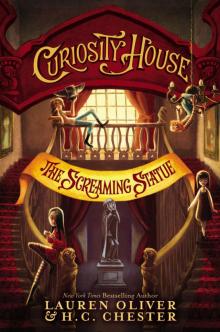 The Screaming Statue
The Screaming Statue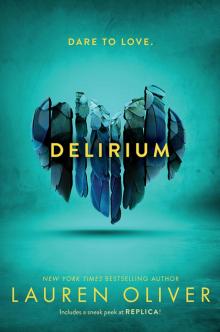 Delirium
Delirium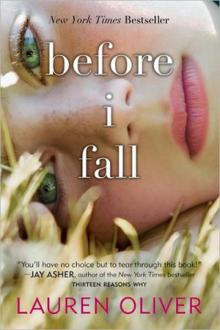 Before I Fall
Before I Fall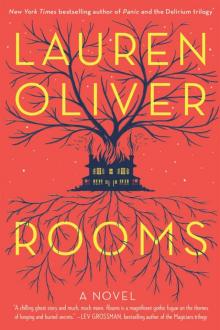 Rooms
Rooms Replica
Replica Ringer
Ringer Pandemonium
Pandemonium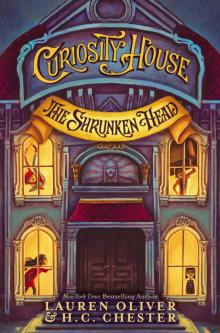 The Shrunken Head
The Shrunken Head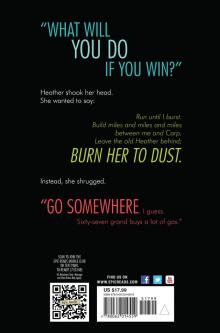 Panic
Panic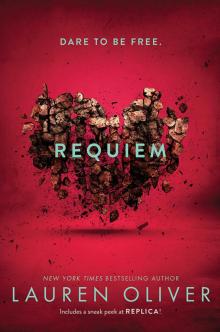 Requiem
Requiem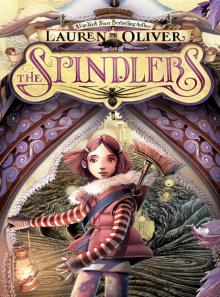 The Spindlers
The Spindlers Annabel
Annabel Liesl & Po
Liesl & Po Raven
Raven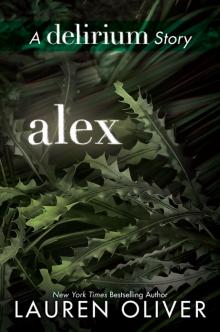 Alex
Alex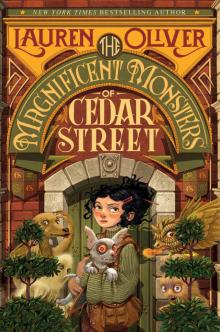 The Magnificent Monsters of Cedar Street
The Magnificent Monsters of Cedar Street Vanishing Girls
Vanishing Girls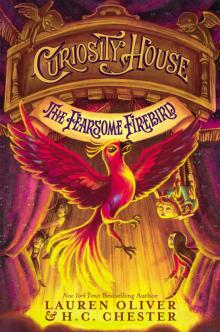 The Fearsome Firebird
The Fearsome Firebird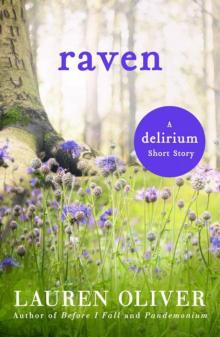 Raven: A Delirium Short Story
Raven: A Delirium Short Story Annabel: A Delirium Short Story
Annabel: A Delirium Short Story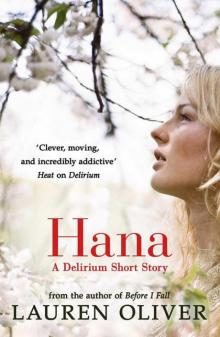 Hana: A Delirium Short Story
Hana: A Delirium Short Story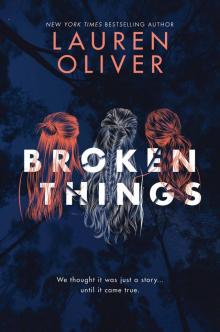 Broken Things
Broken Things Ringer (Replica)
Ringer (Replica)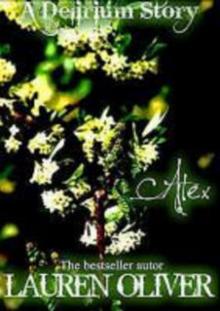 Alex (delirium)
Alex (delirium)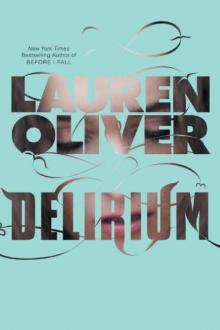 Delirium dt-1
Delirium dt-1